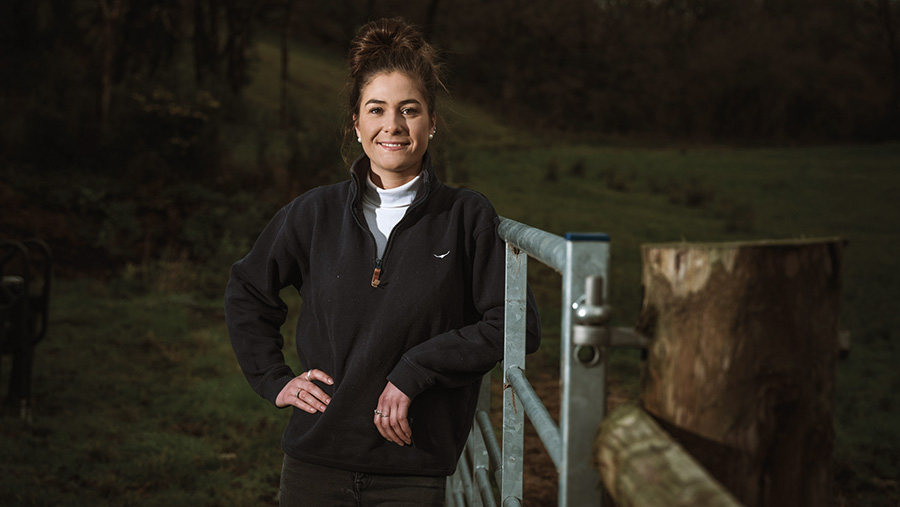Rebecca Wilson: ‘It’s a privilege to help feed the nation’
 © MAG/Colin Miller
© MAG/Colin Miller When Rebecca Wilson graduated, a lot of her friends headed to London for jobs and she wondered if she should also follow that route.
“Thank goodness I didn’t,” says the 26-year-old farmer’s daughter from North Yorkshire, who left Cambridge in 2016 with a human, social and political sciences degree.
“The farm and Yorkshire were where, deep down, I knew I ultimately wanted to be.”
See also: Lucy Nott – eating British only is a tough challenge
So she headed to the Royal Agricultural University for a one-year estate management course to “get her eye back into ag” then had spells working for a surveying firm specialising in utilities and a poultry equipment company.
But Yorkshire and a more hands-on role in the 260ha family business was calling and, as so often happens, fate had a hand in events.
“I’d always loved helping out at evenings and weekends, but my dad was ill and had a spell when he couldn’t drive, so we reached a pinch-point last harvest.
The options were either to get someone in or for my sister, Rosie, or me to help. I came back and don’t think I’ll ever leave now. Thankfully, Dad is well now, so every cloud does have a silver lining.”
Rebecca says she accepts you don’t go into farming for the money, but for the way of life. “There are stresses, but it’s a real privilege to be able to feed the nation and influence how food is produced.”
The fifth-generation farmer highlights how the family try to avoid ploughing, preferring to drill into stubble to improve soil health and reduce emissions.
“My parents have always been forward-thinking, so I’ve been very lucky to have been brought up around that mindset.”
Her motivation for applying for the NFU’s Student and Young Farmer Ambassador programme was a desire to communicate farming messages in a clear and simple way.
“Sometimes farmers speak in riddles and the public often can’t get answers to their questions by googling them.
I want the public to feel a connection to farming and food, and so we have to explain about our quality and welfare standards, plus our carbon-neutral aspirations.”
Her approach, she says, is to be transparent. “There are many great days when you do this job, but some rubbish ones as well. It’s important we don’t show unrealistic, utopian impressions, because it’s not all sunrises and freshly bedded pens 24/7.”
This desire to spread the word is also behind her involvement in Boots and Heels, the Farmers Weekly podcast she co-presents with community editor Lizzie McLaughlin. With Lizzie not from a farming background, the pair make a great double act, taking farming stories to a new audience, as well as to the agricultural community.
“I met lots of people at Cambridge who weren’t from a farming background and I learned that sometimes you do have to stand up for the things you feel strongly about.
“There were people from all over the world there, studying all sorts of subjects, and my course definitely made me more interested in the world around me in terms of everything from anthropology to international relations.
Academic intelligence
“There’s still a stereotype that it’s only people who spend all their time at school in the library who go to Oxford and Cambridge, but I don’t consider myself to be like that – and it was an amazing experience.”
Rebecca thinks academic intelligence is often undervalued in agriculture, but the industry needs newcomers with expertise in so many different areas – everything from science to marketing – so careers advisers should be pointing more high-performers at school towards agriculture.
“We also need to be embracing diversity more, because different people bring different skill sets and perspectives.”
A source of frustration for her is that the lack of knowledge about farming sometimes seen among the general public is echoed at government level.
Whether it’s the new muckspreading rules under the Farming Rules for Water regulations or the drive for rewilding, there isn’t enough emphasis on the importance of food production. “First and foremost, we need food.”
No gender divide
She is asked a lot about being a female farmer, but reckons she’s lucky in that gender divides haven’t been an issue in her family because the farm came down the maternal side and her mum’s always been actively involved, both in a hands-on capacity and in terms of management and strategy.
“Occasionally, if people see me getting on the loader or driving a tractor with a big bit of kit on the back, you can see them thinking; Can she do that? So I see it as an opportunity to prove people wrong.
“There are probably some things I can’t do all that quickly, but I’ll still get them done and the reason I might take slightly longer than necessary isn’t because I’m female, it’s because I haven’t been back on the farm full time for very long yet.
“Give me a year or two and I’ll give all the guys I know at Young Farmers a run for their money.”
About the Ambassadors
Now in its third year, the NFU Student and Young Farmers Ambassador programme gives a group of eight to 12 people a chance to represent the NFU and the next generation through a year-long series of events and experiences.
It’s a great opportunity to network and to put their stamp on the future of British farming.
